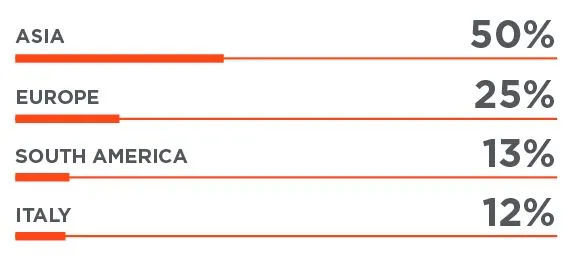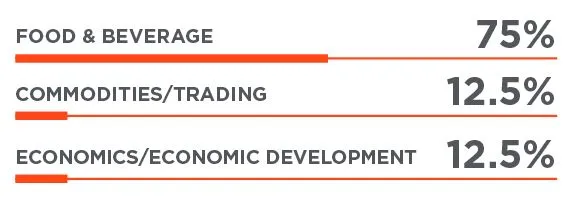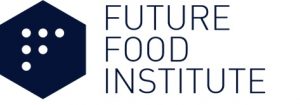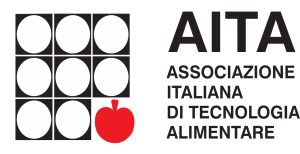
How can we guide and manage innovation in the food industry?
The Executive Master in Food Innovation and Regeneration equips you to become a catalyst for change, providing a systemic view of innovation and the practical skills to drive transformation throughout the entire agri-food supply chain.
The program offers tools and resources to generate and implement innovation, addressing social and environmental challenges, sustainability, and emerging technologies. Aimed at ambitious professionals, it seeks to promote positive and lasting change.
A unique educational experience:
- Part-time hybrid program, developed by BBS and Future Food Institute.
- Two immersive Smart Weeks in Italy (Food Valley and Cilento).
- Opportunity to participate in an optional International Boot Camp (USA, Portugal, Japan).
- Acquisition of an innovative and regenerative mindset.
- Understanding change through forecasting and “prosperity thinking.”
- Development of innovative business models and communication skills.
- Managerial skills to launch successful innovations.
Excellence in Mentoring:
Our personalized mentoring program is a distinctive strength. You will receive individual guidance from expert professionals, providing you with valuable advice, feedback, and access to a high-level network of contacts, all designed to support your professional growth and help you achieve your specific goals in food innovation.
Join us to shape the future of the food industry. Apply for the Executive Master in Food Innovation and Regeneration and become a leader of change.
Accreditation

Bologna Business School is EQUIS – EFMD Quality Improvement System accredited, one of the most important international quality assessment and continuous improvement systems for Schools of Management and Business Administration.

Ludovica Leone
" Agrifood companies today face pivotal challenges that are leading to profound changes, such as the need for more sustainable production processes, reducing food waste, and applying 4.0 innovation.
The Executive Master in Food Innovation and Regeneration provides participants with a systemic vision of innovation and the competencies to lead transformative change and disruptive innovation in the agrifood industry. It is a program dedicated to those who aspire to become a catalyst of change in this field. "

Sara Roversi
" The Emilia Romagna region is known worldwide for its excellence in food and wine: it is a territory where innovation and tradition are both part of its DNA. Today, discussing innovation in the agri-food sector means rethinking business models that encompass a political vision, ecological awareness, social impact, the enhancement of "living heritages," and, of course, economic development, all integrated with the theme of individual health. Food is culture and identity: it brings people together, unites them, and facilitates communication among individuals. In the Executive Master in Food Innovation and Regeneration, we provide a unique opportunity for growth for individuals who are or will be called upon to lead this change. "
Structure
MODULES
The Executive Master in Food Innovation and Regeneration consists of 3 mandatory modules, with an additional optional module abroad. Each module focuses on specific topics and includes online and in-person lectures, testimonials, practical activities, and a final assessment to evaluate participants’ level of learning.
Module 1
BUILDING A REGENERATIVE MINDSET
On-line courses on Tuesdays and Thursdays from 6 pm till 9 pm (September – November)
– Regeneration Mindset
– Integral Ecology Indicators
– Foresight, Food Trends and Regeneration Scenarios
– Innovation Fundamentals in the Food Sector
Smart Week On campus, 4 days, Bologna (November)
Module 2
DEVELOPING SUSTAINABLE INNOVATION
On-line courses on Tuesdays and Thursdays from 6 pm till 9 pm (November – March)
– Prosperity Thinking for Future Food Systems
– Methods and Tools: from theory to practice
– Designinig new Food Products and Experiences
– Creating Sustainable Networks and Ecosystems
Smart Week on Campus, 4 days, Living Lab in Pollica (March)
Module 3
MANAGEMENT TOOLS
On-line courses on Tuesdays and Thursdays from 6 pm till 9 pm (March – June)
– Corporate Strategy
– Food Law and Food Safety
– Food Marketing
– Communication and Change Management
– Measuring Sustainable Performance
– Business Impact and Financing of Innovation
– Supply Chain and Operations
Optional Module
INTERNATIONAL BOOT CAMP
Intensive Learning Experiences in the USA, Japan or Portugal
SMART WEEK ON CAMPUS
Two Smart Weeks, each lasting four days, designed to enhance the value of personal interaction among participants and the School. These two experiences will take place in Bologna and Pollica.
FOCUS SESSIONS
5 seminars aimed at transferring methodological know-how and applicable managerial tools: Consumer-Based New Products
Development for the Food Industry, AI and Data Management in Food Industry, Agenda2030 for Sustainability-Oriented
Innovation, Innovation in Hautè Causine, Alternative Proteins, Innovation in Private Label.
LEADERS INSPIRATIONAL TALKS
Opportunities for discussion with international managers. The purpose of the meeting is to share experiences, business cases and best practices.
COMPANY VISIT
Company visits, organized during in-person time, enabling participants to engage with realities of excellence in food and regeneration.
PROJECT WORK
In the last part of the master, participants, organized into groups, are called upon to develop, putting into practice the knowledge they have acquired, innovative projects. The projects are carried out with the support of professional experts and are presented to management and company representatives at the final day of the Master’s program.
COURSES
Integral ecology means realizing the deep interconnectedness of political, economic, human, environmental, social, and cultural pillars, which is unfortunately often lacking in many large companies’ approaches to sustainability. A strategy to take care of the food system cannot ignore an important transformative factor, largely independent of governmental and institutional actions: a change in mindset, which can only come from spreading a broader awareness about food. This module focuses on regeneration, starting with the soil: regenerating the Earth must be a process and mindset that takes time, the time of nature’s cycles. It is a circle that begins with individuals returning the value of beauty to society and the economy. People and communities are expanding their vision beyond what we need today and tomorrow to what we need 20 years from now. This replaces quick fixes with completely dismantling our thinking to rebuild a more future-oriented mindset.
Roversi SaraFrom Farm to Fork, it is critical today to help sustainable food companies to have a comprehensive understanding of the fundamental principles and advancements in food industry. Accelerating innovation means learning how to build a food system that produces healthy, sustainable food for all. Achieving innovation in global food systems requires an understanding of food chemistry, flavor, and processing. This module will introduce the complex interactions between food components, their transformations during processing, and their impact on sensory properties and human health. The course provides insights into developing functional foods and dietary guidelines for improved well-being and disease prevention.
This module will explore key concepts and methodologies to understand and anticipate future food landscapes, analyze emerging trends, and develop sustainable strategies for the food industry. The course begins with an introduction to foresight methodologies and tools used to anticipate future scenarios in the food sector. Students will gain practical skills in scenario planning and trend analysis, enabling them to assess and respond to future challenges and opportunities. The exploration of food trends forms a significant component of the course. Students will examine the driving forces behind food trends, including shifting consumer preferences, technological advancements, and sustainability concerns. Through case studies and analysis, students will learn to identify and evaluate emerging trends, enabling them to make informed decisions in the evolving food industry.
An essential focus of the course is on regeneration scenarios for the food industry. Students will study innovative strategies to promote sustainable food production, circular economies, and regenerative agriculture. By considering environmental, social, and economic factors, students will learn to develop scenarios that balance sustainability and economic viability. They will possess the skills to anticipate and respond to emerging trends, assess their impact on the food industry, and develop sustainable and regenerative strategies for a future-oriented food system.
Vignoli Matteo
In Italy, Emilia-Romagna is known as the Food Valley, a region that the entire world envies for its gastronomic excellence and widespread high-quality products. Economically, this area boasts established industrial strengths (both in food production and food processing machinery) that connect with an innovative ecosystem comprising startups and readily available radical innovations. Following the “farm-to-fork” philosophy, a strong culinary and restaurant scene has also developed here, establishing its unique identity as an internationally recognized brand.
Il Prosperity Thinking è un approccio metodologico che mira a progettare un mondo in grado di soddisfare i bisogni di tutti gli esseri, rimanendo entro i limiti ecologici del pianeta. Questo concetto si spinge oltre il più tradizionale approccio del design thinking, mettendo il pianeta al centro. Il Prosperity Thinking si propone di consentire la progettazione di un sistema alimentare migliore partendo da un’idea di prosperità condivisa e inclusiva, che comprenda non solo la crescita economica, ma anche il benessere sociale e ambientale. Pensare in ottica di prosperità significa che possiamo prosperare, così come la nostra economia o la nostra attività, solo se prospera anche il pianeta. Questo modulo si concentra sulla metodologia del Prosperity Thinking per i sistemi alimentari del futuro, sul Future Thinking e sul Foresight per la rigenerazione, sul Values Thinking e sui comportamenti alimentari. In questo modulo, i partecipanti acquisiranno familiarità con un approccio che va oltre il design user-centered per arrivare a una progettazione orientata alla crescita incentrata sull’uomo e sul pianeta.
Chhavi JatwaniQuesto modulo offre un’analisi completa delle strategie e dei framework che promuovono l’innovazione all’interno delle organizzazioni. Come applicare in pratica un approccio ecosistemico che abbracci la diversità e la prosperità? Dal Stage and Gate al Systems Thinking. Il modulo introduce come risolvere i problemi, ma, cosa ancora più importante, come identificare opportunità e dinamiche in un processo di innovazione. Imparerai a gestirlo sfruttando l’analisi user-centered, le tecniche di co-creazione e le procedure scientifiche e lean nello sviluppo alimentare. Il corso esplora, con esempi pratici nell’industria alimentare, l’applicazione del Design Thinking, delle metodologie Agile, Stage-Gate e Lean Startup come metodologie di innovazione di spicco. Il corso esamina anche il ruolo della cultura organizzativa nel promuovere l’innovazione, sottolineando l’importanza di creare una cultura favorevole all’innovazione che incoraggi la sperimentazione, accetti il fallimento come opportunità di apprendimento e ricompensi il comportamento imprenditoriale. I partecipanti saranno dotati di strumenti pratici e framework per guidare l’innovazione all’interno delle organizzazioni e affrontare le sfide di un contesto aziendale in rapida evoluzione.
Massari SoniaHow is it possible to build bridges between countries and bring more sustainable practices into the food industry through “innovative and educating products” that can change food behaviors? This module will focus on food trends and new scenarios (new food production, 4.0 technologies applied to the food industry, new food culture, and identity as drivers of innovation). The course begins by investigating the Maillard reaction and its effects on flavor, color, and potentially harmful compounds in food processing. Participants will learn how to optimize processing conditions to enhance flavor while minimizing negative substances. Participants will then examine the impact of various food processing techniques on nutritional quality. They will learn about thermal processing’s effects on nutrient bioavailability and preservation of bioactive compounds. The course emphasizes innovative approaches to maintain nutritional value while ensuring food safety. Sensory analysis and flavor perception are explored in the subsequent segment. Participants will gain knowledge of advanced techniques used to assess sensory properties like aroma, taste, and texture. They will understand the factors influencing flavor perception and learn to develop consumer-friendly food products.
Francisco ‘Paco’ AlvarezBeing able to “connect the dots” to design and innovate food processes, systems, and products. How do we harness creativity and technology to address today’s agribusiness challenges? How can we generate cultural and social innovation through design? This module introduces the Design method applied to the world of food and agriculture, where the designer is increasingly involved in re-designing the value chain of food systems. This module analyzes transdisciplinary and successful case studies on food and design, using the Empathy-Systems Thinking Mindset and toolkit for the Food Sector. The course delves into sustainable food production and waste valorization. Participants will discover strategies to reduce food waste, optimize resource utilization, and promote eco-friendly practices in the food industry. The course emphasizes the value of utilizing food by-products and waste streams to establish a circular economy model.
Massari SoniaLiving Labs are dynamic spaces where we host innovators and people who want to test their ideas and interact with the broader community. Smart Week program, the so-called Boot Camp, will be organized in Pollica Living Lab. The Boot Camp is based on an experiential learning approach that allows participants to engage in a based-workshop environment comprised of live experiences, challenges, prototyping exercises, teamwork-based innovation challenges, mentorship sessions, and inspirational talks presented by visionary food entrepreneurs, policymakers, innovators, and thought leaders. Held in the historic Princes Capano Castle and home of the Mediterranean Diet Study Center “Angelo Vassallo”, Pollica Living Lab espouses the protection of gastronomic pleasure and defense of biodiversity, pride for one’s own identity, and awareness of the continuous exchange between cultures, love for the sea, and roots firmly planted in the earth. The Mediterranean Diet is the perfect example of respecting the landscape, the territory, the community, and the economy, combining creativity with resilience and adaptation. It symbolizes eating together, connecting with the social and natural environments, respecting natural cycles, and promoting healthy diets, lifestyles, and well-being. The Mediterranean Diet should be proposed for its systemic approach, forward-looking mindset, and for the whole range of values that make it so sustainable: resilience, inclusivity, conviviality, and community.
This course specifically targets the executives of modern businesses who confront the growing consumers’ expectations regarding the economic, societal, and environmental impact of their organizations. By utilizing contemporary, economics-based models of firms and markets, a diverse range of strategic real-world scenarios are examined. Students will gain the knowledge and skills to effectively identify and select a superior competitive position, establish and maintain a competitive advantage, and create an organizational context that facilitates the successful implementation of their chosen strategy. Moreover, they will be introduced to analytical tools that support them in making strategic decisions. Extensive research has definitively shown that the creation of innovative business models yields the highest return on investment for fostering innovation and this course provides effective frameworks to validate any high level corporate strategy and product diversification.
Esposito MarkThe course is a dynamic and interactive program designed to empower professionals with the knowledge and skills needed to successfully navigate the complexities of bringing products and services to market. This comprehensive program, divided into four engaging lessons, will feature top professionals as guest speakers, sharing their own business cases to illuminate key topics.
Caroline GattiFontanelli Felippe
The major part of the EU and national food law is structured around the concept of food safety and the legal principles aiming at guaranteeing a reliable risk assessment and an effective risk management. Apart from the food-related issues of quality and intellectual property, the most important “building materials” of the food law are acts establishing the legal principles of food safety, and the administrative procedures and business processes concerning the food safety and the crisis management in that field. More, the entire harmonized regulation concerning the circulation of food in the internal market actually stems from the need to get over national legislations and obstacles driven by food safety concerns; and aims at making it work by harmonizing the safety rules and requirements.
The objective of this course is to give participants the tools to fully understand all the mechanisms above.
Students will acquire essential criteria and methodologies for designing, managing, and optimizing sustainable production and distribution systems, encompassing logistics and operations. By emphasizing environmental sustainability in these systems, they will learn to adopt innovative design and planning approaches. This focus will significantly enhance their skills in developing practical decision-support tools tailored for industrial, manufacturing, and distribution environments, empowering them to drive impactful change in their fields.
Riccardo AccorsiThis course explores how innovation strategy, evaluation tools, and business planning shape the success of new products in the food industry. Participants will learn how to build an effective innovation roadmap aligned with business goals, using both qualitative and quantitative methods to assess and prioritize innovation projects. The course also provides practical guidance on developing robust business cases and innovation-focused business plans. Through real-world examples and interactive exercises, participants will gain hands-on experience in translating innovative ideas into viable, market-ready solutions with measurable business impact.
Munari FedericoToschi Laura
The course aims to provide students with an introduction on how to measure sustainability in organizations. Specifically we will highlight how the agri-food sector could benefit from a proper implementation of sustainability measurement processes and practices. The course will have an “hands-on” approach, rooted in Life Cycle Thinking, and developed in accordance with the EU main regulatory frameworks. Students will receive the necessary knowledge for setting up a Life Cycle Assessment (LCA) for a product, a process or an organization. The course will provide a solid theoretical introduction and but also practical activities which will allow students to deal with the main critical aspects of the LCA methodology (e.g. conceptual model definition, interpretation of results) and acquire a first practical experience of these tools.
Mura MatteoZanni Sara
The course aims to provide the right tools and competences needed to become a change maker in organizations going through both the soft and hard skills needed to lead change in organizations. In particular the course will delve into organizational change and how innovation and change can be properly communicated and introduced in organizations, considering the following topics: what is organizational change and why it is so difficult to change (sources of change and sources of resistance to change); how to communicate change (the role of perception, visual management and feedback); how to become a change maker (how to learn a new pattern, the emotional side of change and facilitating change); collaborative innovation at work; team emotional intelligence and how to increase social capital; a scientific approach to change.
Ghini MassimilianoLeone Ludovica
Faculty
Faculty members at Bologna Business School work together offering outstanding teaching standards. An international and interdisciplinary approach is guaranteed by a joint team of distinguished national core professors, adjunct, visiting professors, guest speakers and top managers.
-
Paolo Borghi
Full Professor of Food Law and of EU Agricultural Law
University of Ferrara
-
Caroline Gatti
Founder
ODARA Marketing
-
Chhavi Jatwani
Director of Research and Innovation
Food for Climate League
-
Mark Esposito
Visiting Professor of Strategy
Bologna Business School
-
Felippe Fontanelli
General Manager Europe
Wicked Foods
-
Francisco Alvarez
Food Alchemist Manager
Future Food Institute
-
Massimiliano Ghini
Director
European Center for Team Emotional Intelligence
-
Ludovica Leone
Senior Assistant Professor in Organizational Studies & Industry Leader Global MBA Food&Wine
University of Modena and Reggio Emilia
-
Sonia Massari
Director
Future Food Academy
-
Federico Munari
Full Professor of Technology and Innovation Management
University of Bologna
-
Matteo Mura
Associate Professor of Management Control Systems
University of Bologna
-
Riccardo Accorsi
Professore Associato
Università di Bologna
-
Sara Roversi
President
Future Food Institute
-
Laura Toschi
Associate Professor in Entrepreneurship and Innovation
University of Bologna
-
Matteo Vignoli
Associate Professor
University of Bologna
-
Sara Zanni
Assistant Professor of Business Sustainability
University of Bologna
Target


The Master’s program is designed for experienced professionals who seek to broaden their skills and expand their expertise across multiple business functions.
Alumni

Elena Sirtori
R&D Manager at Montenegro
EMIFIR I - 2023/2024
"The Executive Master in Food Innovation and Regeneration has profoundly enriched my professional journey. Through its transdisciplinary approach and consideration of diverse scenarios, I have gained invaluable tools and insights. The program's emphasis on culture and placing the planet at the center of its mission has inspired a collective drive among my colleagues and me to foster sustainable and regenerative practices."

Rakchai Rengsomboon
Founder, CEO & Engineering Team Lead at Fruita Biomed Co.,Ltd
EMIFIR I - 2023/2024
" Imagine immersing yourself in real industry insights, where every class discussion brings depth to the challenges and opportunities you face in your career. With hands-on experiences ranging from global corporations to local boutiques, you'll gain invaluable first-hand knowledge through factory visits during our immersive smart weeks. Connect with a diverse network of classmates, each bringing unique perspectives on international markets, cultures, and technologies. This isn’t just learning; it’s about building a rich tapestry of experiences that will shape your business and professional acumen."
Networking
The Executive Master in Food Innovation and Regeneration gives the opportunity to engage with cutting-edge businesses through the on-campus Smart Week, Leadership Talks and events dedicated to the BBS community, for which it has been designed a dedicated platform that enable interaction among Alumni and current participants.
COMPANIES
The Executive Master’s in Food Innovation and Regeneration provides a unique opportunity to engage with cutting-edge business realities through on-campus smart weeks and exclusive events. We have also developed a dedicated digital platform to facilitate interactions between alumni and current participants. This program has been co-designed with prominent companies to ensure its relevance and alignment with industry needs:
AGRINTESA AGRISFERA ALCE NERO AMADORI ARETÈ ATLANTE BONIFICHE FERRARESI CAAB CAMST CARPIGIANI CAVIRO CELLI GROUP CIRFOOD CLECA COIND CONFCOOPERATIVE COOP ITALIA ELECTROLUX ERIDANIA EURO COMPANY FERRARELLE FRANTOIO VALSANTERNO GRANAROLO LEGACOOP MONTANARI & GRUZZA MONTENEGRO NOSTROMO PARMALAT ROMAGNATECH TAMPIERI TETRA PAK TOSCHI VIGNOLA UNIGRÀ VILLANI
Programme Advisory Committee
Duccio Caccioni – Marketing Director, CAAB
Mauro D’Errico – President, Fra Diavolo Fragesa S.r.l.
Community
COMMUNITY AND CAREER DEVELOPMENT
During the Master, a series of seminars with head-hunters and HR managers are offered, to provide tools and resources to contribute to your career development and how to enter the job market in leadership positions.
Once the Master is ended, it is possible to join the activities dedicated to the Community, to further increase your own network. Furthermore, meetings open to the entire BBS Community are periodically scheduled with managers, entrepreneurs and guests, focusing on the different scenarios of a constantly evolving society and market.
FEES
The registration fee for the Master’s course on a company basis is 18.200 Euros + VAT.
The registration fee for the Master’s course on an individual basis is 15.200 Euros + VAT.
YOUR FUTURE STARTS AT BBS. CONTACT OUR TEAM FOR MORE INFORMATION ON:
-
Scholarships and Financial Aid
-
Financing and Payment Plans
-
Professional Funds and Corporate Welfare
For more details, contact us at foodinnovation@bbs.unibo.it
Funding
For individual access to the Master’s program, two financing options are available:
“MERIT” LOAN – BANCA INTESA
-
No collateral required
-
Special interest rates
-
24-month grace period with repayment over 30 years
-
To qualify, you need a degree score of at least 98/110, residence in Italy, and enrollment in the Master’s program.
“FUTURIAMO” LOAN – BANCA BNL
-
Special interest rates
-
Repayment period of 10 years
-
Option to delay the first payment for up to 36 months
- To qualify, you need to be residence in Italy, and enrollment in the Master’s program.
For more information, email us at foodinnovation@bbs.unibo.it
INTERPROFESSIONAL FUNDS
Special terms are available thanks to Interprofessional Funds:
- Fondimpresa – for middle management: fondimpresa.it
- Fondo Dirigenti PMI – for executives of industrial SME’s: fondodirigentipmi.it
- Fondirigenti – for executives: fondirigenti.it
SCHOLARSHIPS
BBS | Women Initiative
At Bologna Business School we understand the importance of financial aid in supporting our participants to achieve their educational goals. We are aware that an advanced, high quality training path can be a significant commitment, at the same time we also truly believe that investing in education always pays back.
This is why Bologna Business School is pleased to offer partial scholarships, thanks to the “Women Initiative”.
For further details on the requirements and application modality, please contact foodinnovation@bbs.unibo.it
APPLICATION PROCESS
Admission is subject to passing an online selection process by appointment (contact Gaia Giuffredi – foodinnovation@bbs.unibo.it).
The selection process consists of:
Entry test: duration max 30 minutes, online
Assessment interview with Directors of the master, duration 30 minutes, online
The selection process is non-binding on entry and will assess master’s requirements (educational qualification and work experience), profile and development goals.
The Master’s program is open to graduates with more than 3 years of professional experience and non-graduates with at least 5 years of work experience.
FAQs
Should a group of colleagues wish to participate in the program, it is possible to contact the Program Manager to evaluate an ad hoc participation price.
The majority of participants have degrees. A quota of applicants who do not hold a three year degree and with a minimum 5 years of professional experience can be admitted





